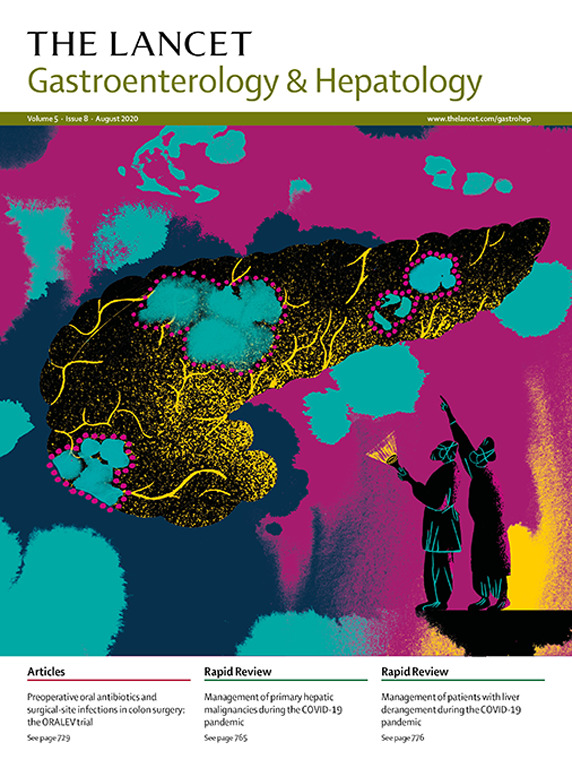Efficacy of gut–brain neuromodulators in irritable bowel syndrome: an updated systematic review and meta-analysis
IF 30.9
1区 医学
Q1 GASTROENTEROLOGY & HEPATOLOGY
引用次数: 0
Abstract
Background
Gut–brain neuromodulators might be efficacious for irritable bowel syndrome (IBS), but there has been no synthesis of evidence from randomised controlled trials (RCTs) of some drug classes, and whether they have pain-modifying properties in IBS is unclear. We updated a previous systematic review and meta-analysis of RCTs examining these questions.Methods
We searched MEDLINE (from Jan 1, 1946, to Jan 1, 2025), Embase and Embase Classic (from Jan 1, 1947, to Jan 1, 2025), and the Cochrane Central Register of Controlled Trials (from database inception to Jan 1, 2025). Trials recruiting adults with IBS and that compared gut–brain neuromodulators versus placebo over at least 4 weeks of treatment were eligible. Dichotomous symptom data were pooled using a random effects model to obtain a relative risk (RR) of remaining symptomatic after therapy, with a 95% CI.Findings
The search strategy identified 3625 citations. 28 RCTs were eligible containing 2475 patients. Ten RCTs were identified since our previous meta-analysis, containing 1348 patients. The RR of global IBS symptoms not improving with gut–brain neuromodulators versus placebo in 22 RCTs (2222 patients) was 0·77 (95% CI 0·69–0·87). The best evidence in terms of persistence of global IBS symptoms was for tricyclic antidepressants (TCAs) in 11 trials (1144 patients; RR 0·70, 0·62–0·80). The RR of abdominal pain not improving with gut–brain neuromodulators versus placebo in 19 RCTs (1792 patients) was 0·72 (95% CI 0·62–0·83). The best evidence was for TCAs in seven trials (708 patients; RR 0·69, 0·54–0·87), but there was also a benefit of selective serotonin reuptake inhibitors in seven RCTs (324 patients; RR 0·74, 0·56–0·99), and serotonin and norepinephrine reuptake inhibitors in two trials (94 patients; RR 0·22, 0·08–0·59). Adverse events were not significantly more common with gut–brain neuromodulators, although rates of withdrawal due to adverse events were significantly higher. The certainty in the evidence for tricyclic antidepressants for global IBS symptoms was moderate, but it was low to very low for all other endpoints and drug classes studied.Interpretation
Some gut–brain neuromodulators are efficacious in reducing global symptoms and abdominal pain in IBS. The findings support guidelines that recommend use of tricyclic antidepressants for ongoing global symptoms or abdominal pain but also highlight a potential for SSRIs to be modestly effective for abdominal pain. More data for SNRIs, azapirones, and tetracyclic antidepressants in IBS are required.Funding
None.肠-脑神经调节剂治疗肠易激综合征的疗效:一项最新的系统综述和荟萃分析
背景肠-脑神经调节剂可能对肠易激综合征(IBS)有效,但一些药物类别的随机对照试验(rct)尚无综合证据,而且它们是否具有缓解肠易激综合征疼痛的特性尚不清楚。我们更新了之前的系统综述和荟萃分析的随机对照试验来检验这些问题。方法检索MEDLINE(1946年1月1日至2025年1月1日)、Embase和Embase Classic(1947年1月1日至2025年1月1日)和Cochrane Central Register of Controlled Trials(从数据库建立到2025年1月1日)。招募成人肠易激综合征患者,并在至少4周的治疗中比较肠-脑神经调节剂和安慰剂的试验是合格的。采用随机效应模型对二分症状数据进行汇总,以获得治疗后剩余症状的相对风险(RR), CI为95%。搜索策略确定了3625条引用。28项随机对照试验纳入2475例患者。自我们之前的荟萃分析以来,确定了10项随机对照试验,包含1348例患者。在22项随机对照试验(2222例患者)中,肠-脑神经调节剂与安慰剂相比,整体IBS症状未改善的RR为0.77 (95% CI 0.69 - 0.87)。在11项试验(1144例患者;Rr为0.70,0.62 ~ 0.80)。在19项随机对照试验(1792例患者)中,肠-脑神经调节剂与安慰剂相比,腹痛未改善的RR为0.72 (95% CI 0.62 - 0.83)。7项试验(708例患者;RR 0.69, 0.54 - 0.87),但在7项随机对照试验(324例患者;RR = 0.74, 0.56 - 0.99),以及5 -羟色胺和去甲肾上腺素再摄取抑制剂(94例患者;Rr为0.22,0.08 - 0.59)。肠-脑神经调节剂的不良事件并不明显更常见,尽管不良事件引起的停药率明显更高。三环类抗抑郁药治疗IBS症状的证据的确定性是中等的,但在所有其他终点和研究的药物类别中,证据的确定性是低到非常低的。一些肠-脑神经调节剂对减轻肠易激综合征的整体症状和腹痛有效。该研究结果支持了建议使用三环类抗抑郁药治疗持续的全身症状或腹痛的指南,但也强调了SSRIs对腹痛适度有效的潜力。需要更多SNRIs、阿扎吡酮类和四环抗抑郁药治疗IBS的数据。
本文章由计算机程序翻译,如有差异,请以英文原文为准。
求助全文
约1分钟内获得全文
求助全文
来源期刊

Lancet Gastroenterology & Hepatology
Medicine-Hepatology
CiteScore
50.30
自引率
1.10%
发文量
0
期刊介绍:
The Lancet Gastroenterology & Hepatology is an authoritative forum for key opinion leaders across medicine, government, and health systems to influence clinical practice, explore global policy, and inform constructive, positive change worldwide.
The Lancet Gastroenterology & Hepatology publishes papers that reflect the rich variety of ongoing clinical research in these fields, especially in the areas of inflammatory bowel diseases, NAFLD and NASH, functional gastrointestinal disorders, digestive cancers, and viral hepatitis.
 求助内容:
求助内容: 应助结果提醒方式:
应助结果提醒方式:


